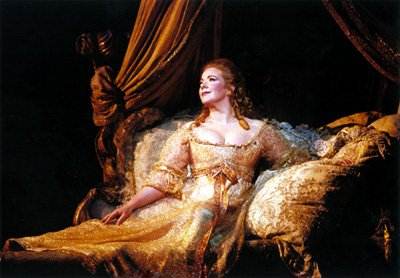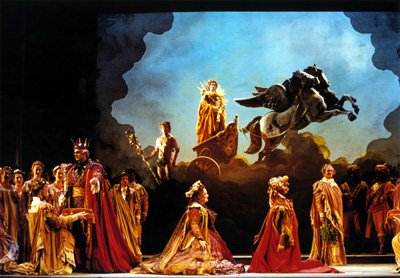S & H Opera Review
Handel ‘Semele’, Royal Opera House, Covent Garden. 28th June 2003. (M.E.)
'Semele' has a strong party against it, viz. the fine ladies, petit maîtres, and ignoramus’s’ wrote Mrs. Delany in 1744, and this ‘bawdy opera’ as Jennens described it, unique in its blending of Congreve’s satirical libretto with Handel’s ravishing music, lends itself naturally to interpretations which take into account the parallels between King William’s sexual adventures and those of the mythological Jupiter – precisely the kind of interpretations with which ‘ignoramus’s’ feel uncomfortable, and which those who really can’t stomach anything much other than sugary stage pictures will be inclined to dislike. No problem with that here: all is convention and safety, not so much bawdy as gently risqué.When this production was first seen at Covent Garden in 1982, it was already looking passé: now, after more than twenty years of Handel scholarship and innovative productions, it looks positively archaic – although that was probably always the aim. As someone who actually saw the 1982 production, I don’t particularly object to such a charmingly old-fashioned revival: what I do object to, however, is the fact that whilst the ‘original’ was cast with real Handelian singers, including Valerie Masterson and Robert Tear, followed by Yvonne Kenny and Anthony Rolfe Johnson in the first revival of the production in 1988, this one was cast, as far as the main parts were concerned, entirely from what it would be most polite to call non-Handelians.
What is even more inexplicable, when one considers how many great British Handel singers there are around, is that it should be a virtually all-American cast, at least in terms of the major parts! One might retort, well, it was most recently revived in San Francisco – true, but who sang the male lead there? Why, the not exactly Californian tenor John Mark Ainsley, who also took the part in the recent, brilliant ENO production: obviously, it’s clear where my inclinations as to production styles lie, but what concerns me far more deeply is the actual singing – and if one leaves the production side entirely out of things, any comparison between Rosemary Joshua’s ENO Semele and Ruth Ann Swenson’s here, between Sarah Connolly’s ENO Ino and Stephanie Blythe’s here, and between Ainsley’s ENO Jupiter and Kurt Streit’s here, cannot fail to leave the Americans in the dust. I am not anti-American: I did marry one, after all – but what I am against is perverse casting which does little service to the work itself and the core of our musical heritage (today’s ‘Sunday Times,’ commenting on the same issue, asks parenthetically ‘Are we bereft of Handelians?’) As they and I are aware, far from it, but one would never know that from a visit to the ROH at present.
RUTH ANN SWENSON as SemeleIt’s a pretty, blowsy, organdie and lace production, with most of the visual elements derived from paintings by Boucher – nothing wrong with that, except that Boucher’s cherubs are erotically playful rather than nauseatingly coy. Maybe it is the kind of thing that Handel’s own audiences saw when they went to the theatre, complete with creaky, cardboard cut-out type sets and amateurishly blocked movement, but somehow I doubt it. True, there are many scenes where the stage is, or seems, full, but it is possible to achieve grace and coherence even in those circumstances. One sees lots of gauzy, nicely lit set pieces, without being at all moved by any of it: contrast, say, the scene where Ino tells Semele about her journey and they sing a ravishing duet, with the ENO version of the same: here, we had the two singers posturing in their vast dresses whilst warmly lit rustics in shades of maroon and orange cavorted about, whereas at ENO the stage picture was simply, yet enchantingly created with a deep blue sky against which meaningful actions such as Jupiter giving Semele the moon, took place, with every gesture, even from the chorus, in keeping with the music.
Ruth Ann Swenson has a pretty, high voice and indulges in lots of warbling and yodelling – amusingly punctuated by Mackerras’ uplifted index finger at high notes - Up! Up! Up! – but it’s not exactly Handel, more the Queen of the Night crossed with Charlotte Church. Semele has some of the most exquisite music ever written for the soprano voice – ‘Oh Sleep, Why Dost Thou Leave Me,’ ‘Myself I Shall Adore’ and ‘Endless Pleasure’ are always such a joy to hear, and Swenson was at her best in less showy moments such as ‘Oh, Sleep,’ where the true beauty and sweetness of her tone were heard to most advantage.
Kurt Streit, unlike, say, Anthony Rolfe Johnson, actually looks like a Greek God – but he does not sing like one, and I know which Jupiter I’d prefer to hear. I have yet to read any comments about his actual singing: he looks great and moves well, but what he does not do is sing the music with the fluency, ease of line, beauty of tone and agility it demands. It’s perfectly possible to sing, say, ‘Leave Your Doubts and Fears Aside’ with perfect line, virtuosic grace and sensitivity to words whilst still presenting a convincing lover, but Streit sang this, and ‘Where’er You Walk’ with feeling for the phrases but little beauty or suppleness of tone, and there was much strain at the top where there should be a sense of freedom.
STEPHANIE BLYTHE as Ino/Juno
ROBIN BLAZE as AthamasStephanie Blythe is another vocally miscast American: she was ideal as Mistress Quickly to Bryn Terfel’s Falstaff, but her versatility does not really extend to this music. Histrionically she vamps it up for all she’s worth, especially in ‘Above measure, is the pleasure’ and she always sings clearly and in tune, which of course are great virtues but they alone do not a Handel mezzo make. The object of her not-long-secret passion, Athamas, was sung by Robin Blaze, whose voice is simply too small for this or any other medium sized house.
The other roles fared somewhat better: however, one might ask again, when there are so many fine British basses, why cast John Relyea as Somnus / Cadmus? He was serviceable as Cadmus, but his Somnus was something else – it’s a gift of a part, of course, but the stage really came alive with his scene, and ‘Leave me, loathsome light’ was very finely sung. The appearance of Sally Matthews as Iris (complete with multi-hued umbrella and swathes of rainbow fabric, nudge-wink) almost led this reviewer to go down on her knees & say ‘Ye Gods! Finally, an actual! Genuine! Handelian voice!’ Almost, but not quite, since her diction is as yet poor and she misses out connectives whenever she feels like it, but she’s still more than promising. Edgaras Montvidas is yet another of those tenors (yawn) who is frothed over and described as the greatest thing since Wünderlich: on this showing as Apollo, his voice is undistinguished.
Orchestrally speaking, Mackerras led a competent performance lacking in a certain drive and sparkle – I missed some necessary wit in the playing, and parts sounded rather dull, although the continuo often supplied a sparkle lacking onstage. I was not as distressed at the choral singing as others have been: maybe things had settled down by the second night, but it sounded acceptable to my ears – although I question whether ‘acceptable’ is quite enough at one of the world’s great lyric theatres.
Underwhelming, might be my overall view of this production, but it remains to be said that I still think it’s worth reviving: ‘Semele’ is one of the greatest works in the whole canon, and the opportunity to hear such music as ‘But hark! the heav’nly sphere turns round’ and ‘Where’er You Walk’ should always be grasped – even when it is presented by singers who are not ideally cast. If just a handful of last night’s audience walk away wanting to hear it again, or to hear more of Handel’s oratorios and operas, then I consider that the ROH has partly fulfilled its remit. Some new Handel productions soon, please.
Melanie Eskenazi
PHOTO CREDIT BILL COOPER
1)RUTH ANN SWENSON as Semele
2)STEPHANIE BLYTHE as Ino/Juno
ROBIN BLAZE as Athamas
SEMELE by George Frideric Handel
Royal Opera, London 06/03
Conductor: Charles Mackerras
Director: John Copley
Set Designer: Henry Bardon
Costume Designer: David Walker
Choreographer: Eleanor Fazan
Original Lighting: Robert Bryan


 Return to:
Return to: